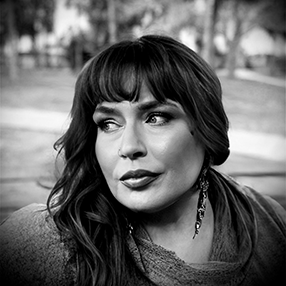We must have gills
hidden under keloid skin,
because sometimes we are too
tired from forging rivers, navigating
tides, and crossing gulfs.
I convince myself I can breathe underwater.
How else have we emerged from
Gulf loop currents and New Sargasso seas?
Traiteurs, Yukhiti Ipošok, Root-workers, Bean feasa,
and Alikchi speak in Kréyol-Mobilian currents to grandmothers
lost, tossed, and surfaced on Gulf shoals and riverbanks.
Yemaya, Šiwāt-Oket, Mélusine
Hvashi, and Mami Wata, lick tears—
Water-women swallowing salted prayer drops.
Give us salinity to float in the betweens.
Surrender to flood waters.
We could not be drowned—
so they sought to bind us
—land-locked.
But these songs dredge-up memories like water
pouring from spaces between soil and root, flood dry plains
lifting to carry me through the hurricane.
Speaking in polyvocal tongues center of eye calm
makes way for calamity. We know how to swim
holding our breath across generations.
You see, we do have gills…
It’s where we keep our stories.
It’s how we float.
Copyright © 2024 by Rain Prud’homme-Cranford. Originally published in Poem-a-Day on February 15, 2024, by the Academy of American Poets.
“The late Janet Ravare Colson, matriarch of the modern Louisiana Creole revitalization and activism movement, centers ‘our need to define who we are’ through our unique cultural space as ‘unapologetically Louisiana Creole’—with grounded and distinct Peoplehood. I hope this poem channels that mission—recognizing cultural matrices and eco-intimacies between kincestors, land/water relations, and those storied ways of knowing that are held in the body. I think of ‘Gills’ as a hatwén/prière (prayer) calling upon those matrices and stories, those kincestors both human and more than human within our land/waterscapes. This culture, this inheritance, that keeps us afloat even through the current ecological devastations of our homelands.”
—Rain Prud’homme-Cranford

